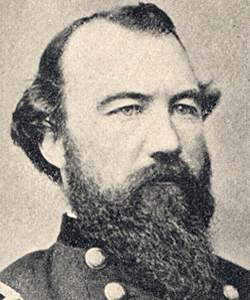John Baillie McIntosh (American National Biography)
Scholarship
Despite family ties to the South…John McIntosh cast his lot with the Union. Early in June he obtained a commission in the Second U.S. Dragoons; two months later he transferred to the Fifth Cavalry…. Throughout the Peninsula campaign McIntosh was cited for gallantry and combativeness, but he found little opportunity to distinguish himself in the subsequent campaign in western Maryland that culminated in the battle of Antietam.
McIntosh remains one of the lesser-known figures of the Civil War, despite the variety and magnitude of his contributions…. His most conspicuous performance came on the third day at Gettysburg, when he built a formidable barrier against Stuart's advance and maintained it through judicious use of mounted and dismounted troopers and horse batteries, shoring up threatened sectors in timely fashion and taking the offensive as opportunities arose. …Averell, Gregg, Sheridan, and James Harrison Wilson considered him one of their most reliable subordinates. Still, McIntosh waited a long time for promotion to brigadier general and never rose above brigade command, a failure partially explained by his lack of a West Point diploma and of active political support in Washington.
Though plagued by an excitable temperament that sometimes expressed itself in violent bursts of anger, McIntosh maintained the respect and confidence of his troopers. Perhaps the most dramatic evidence of his popularity was a petition that numerous members of his brigade sent to the War Department in January 1864, seeking promotion for "a polished gentleman, a strict disciplinarian, and an earnest Soldier."
McIntosh remains one of the lesser-known figures of the Civil War, despite the variety and magnitude of his contributions…. His most conspicuous performance came on the third day at Gettysburg, when he built a formidable barrier against Stuart's advance and maintained it through judicious use of mounted and dismounted troopers and horse batteries, shoring up threatened sectors in timely fashion and taking the offensive as opportunities arose. …Averell, Gregg, Sheridan, and James Harrison Wilson considered him one of their most reliable subordinates. Still, McIntosh waited a long time for promotion to brigadier general and never rose above brigade command, a failure partially explained by his lack of a West Point diploma and of active political support in Washington.
Though plagued by an excitable temperament that sometimes expressed itself in violent bursts of anger, McIntosh maintained the respect and confidence of his troopers. Perhaps the most dramatic evidence of his popularity was a petition that numerous members of his brigade sent to the War Department in January 1864, seeking promotion for "a polished gentleman, a strict disciplinarian, and an earnest Soldier."
Edward G. Longacre, "McIntosh, John Baillie," American National Biography Online, February 2000, http://www.anb.org/articles/05/05-00506.html.



